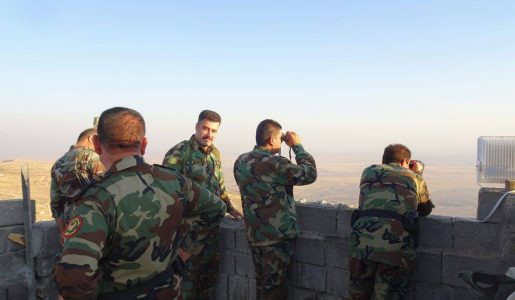
Islamic State terrorists find refuge and rebuild networks in northern parts of Iraq
The black-clad figures are barely visible through binoculars from atop this mountaintop lookout in northern Iraq.
One crouches near stagnant water at the end of a dry riverbed. His companion stands over him and then walks out of view beneath an escarpment, moving without any apparent fear of exposure.
From their position on top of the mountain, the Kurdish peshmerga, the renowned armed forces of the autonomous Kurdistan Regional Government, say Islamic State fighters are living in caves in the no man’s land between Kurdish and Iraqi security forces on the plains below.
This area of northern Iraq includes disputed territories of the central government in Baghdad and the regional authorities in Irbil. It is in ungoverned spaces like this where Kurdish officials say ISIS is rebuilding its networks and running guns between clusters of caves to desert holdouts.
The development is troubling after the grinding struggle and sacrifice involved in rolling back the Islamic State group and its self-proclaimed “caliphate” in Iraq and Syria over the past three years.
President Trump has said the caliphate, which once covered a broad swath of territory and such major cities as Mosul and Fallujah, has been “decimated,” but security analysts say the Islamic State has been scattered but not defeated and still claims the allegiance of thousands of fighters.
U.S. forces are advising and assisting the Iraqi security forces and Kurdish peshmerga to help root out the ISIS remnants. On Sept. 10, U.S. Air Force F-15s and F-35s dropped 80,000 pounds of bombs on an island that the allied coalition said was “infested” with ISIS.
“We’re setting the conditions for our partner forces to continue bringing stability to the region,” Air Force Maj. Gen. Eric Hill, commander of special operations for the Iraqi allied campaign, told reporters at the time. The goal, the general said, was to “disrupt [the Islamic State‘s] ability to hide in the thick vegetation.”
The Pentagon is clearly concerned about a resurgence of the Islamic State, given Iraq’s deeply unsettled political scene. Internal feuding among the Kurds and tensions between Irbil and Baghdad are complicating the mission, according to an inspector general’s second-quarter 2019 report on the state of the Iraqi mission against the Islamic State.
Source: Washington Times





